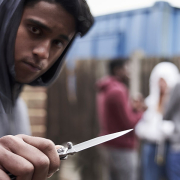Axel Muganwa Rudakubana: Teen Behind the Southport Stabbings (2024)

On 29 July 2024, a children’s holiday workshop in Southport, Merseyside turned into a scene of terror. That morning, 17-year-old Axel Muganwa Rudakubana walked into a community dance and yoga studio filled with young children and parents. Wearing a green hoodie and a surgical mask and armed with an 8-inch kitchen knife, Axel launched a frenzied stabbing spree without saying a word.
He moved “quickly throughout the room,” slashing and stabbing at random. In the span of minutes, three little girls: Bebe, Elsie, and Alice lay fatally wounded. Nine other children and two adult staff were also injured, many gravely.
Amid scenes of chaos and heroism teachers shielded children and led them to safety, Axel was finally confronted by a man from a nearby office and then tasered by police who arrived on scene. He dropped his knife and was arrested without resistance, his silent rampage brought to an end.
Background: The sheer brutality of the Southport attack shocked Britain, and even more troubling were signs that warnings had been missed. Axel was born in the UK to Rwandan refugee parents and had no known extremist ideology but he had a long history of violent fantasies and alarming behaviour.
At 13, he told a counsellor he “wanted to kill somebody” who bullied him. He brought knives to school repeatedly and was expelled after threatening classmates. He was referred three times to the government’s anti-extremism Prevent program due to his obsession with mass killings.
He researched school shootings during IT class, posted images of dictators like Gaddafi, and looked up terrorist attacks online. However, Prevent officials decided his case did not meet the threshold for a terrorism de-radicalisation program since he lacked a clear ideological motive.
In truth, Axel’s fascination seemed to be violence for its own sake prosecutors later suggested he was driven by “the commission of mass murder as an end in itself” rather than any political or religious cause.
Chillingly, after his arrest investigators discovered he had been experimenting with making ricin poison and had a PDF of an al-Qaeda training manual on his computer, leading to additional terrorism charges.
This raised questions about whether a terrorist ideology had begun to influence him after all, or if he simply gravitated to any tools of mass violence.
Outcome: In January 2025, facing overwhelming evidence, Axel pleaded guilty to 16 charges, including three murders, ten attempted murders, and even a charge for producing a biochemical weapon.
Being 17 at the time of the crime, he narrowly avoided a possible whole-life prison order. Instead, a judge sentenced him to life imprisonment with a minimum of 52 years to serve.
He will be in his 70s before he can even be considered for release. Prosecutor Ursula Doyle described Alex’s attack as a “meticulously planned rampage” infamous for its “savagery and senselessness”, noting how he had been “obsessed with violence” from a young age and showed no remorse for the atrocity.
The case has prompted intense scrutiny of the Prevent program and social services. Authorities launched reviews into how a known troubled youth slipped through the cracks and why earlier red flags weren’t acted upon.
In the aftermath, Britain grappled with the unsettling fact that a teenager with no clear ideology could carry out an act so cruel targeting innocent children simply to fulfil a violent impulse.





